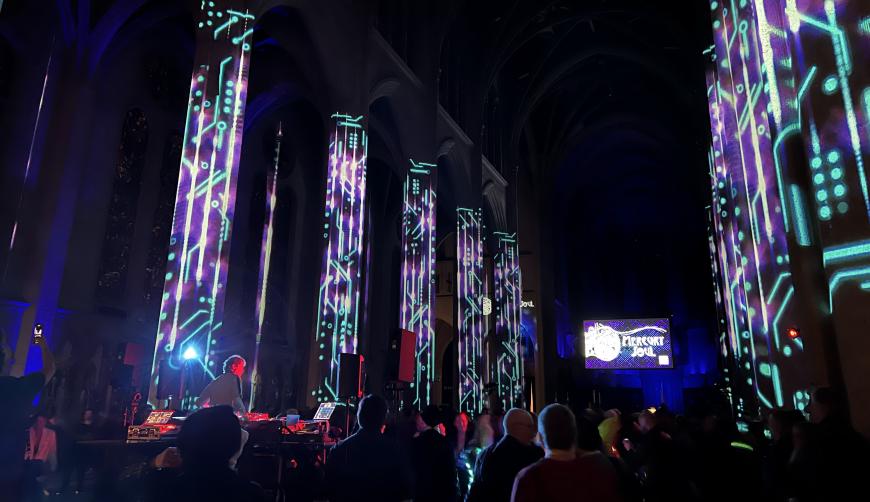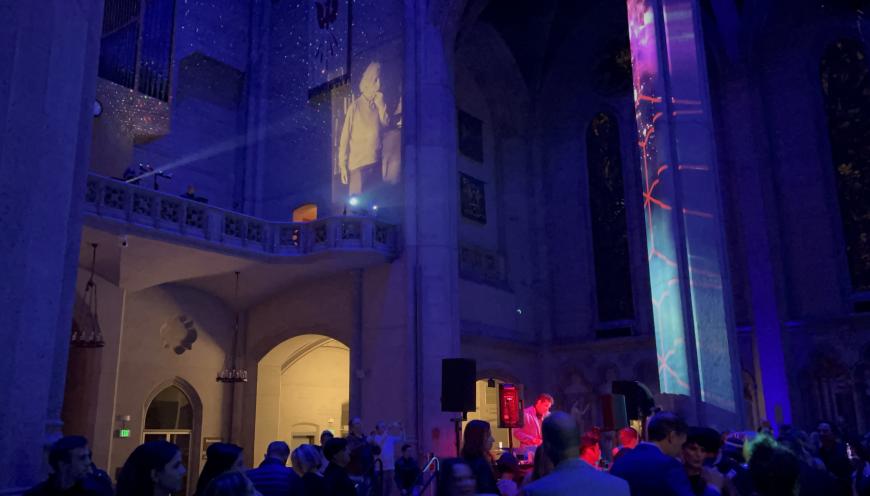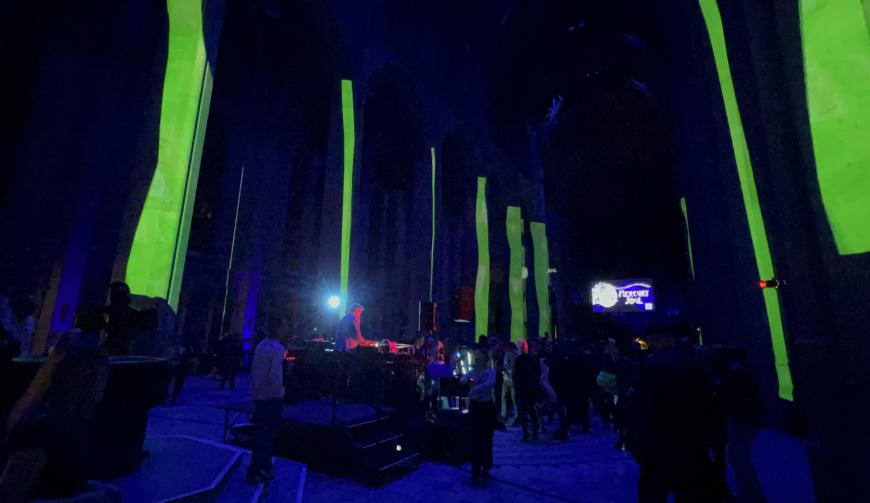
“It was a religious experience,” people say about seeing a great show. Mercury Soul, the classical-cum-club series spearheaded by composer Mason Bates, puts on a good one — on Friday, not so much debauched as devout. There’s nothing quite so edifying as watching a light show (accompanied by William Byrd’s motet Ave verum) streaming down the grand columns of San Francisco’s Grace Cathedral. “We should be tripping,” a woman my mother’s age remarked.
The performers skewed young, many of them San Francisco Conservatory of Music students, but the patrons were of all ages. Since 2008, Mercury Soul — founded by Bates, conductor Benjamin Schwartz, and visual designer Anne Patterson — has presented multimedia events that aim to make classical music more approachable, softening the experience, as Bates put it.
Although I am not qualified to evaluate the DJ sets by Rob Garza and Justin Reed, they were at a tasteful volume and made people happy in between the chamber performances of brief, reflective music. Bates’s own electroacoustic interludes culminated in a sustained meditation on a single pitch — not unlike the prelude to Das Rheingold, if (like Wagner) a little overlong.

And when the show got started? Catholic music — big C and little. In a program that spanned four centuries, one curiosity was the solo organ music of the little-known contemporary composer Jean-Louis Florentz. Spiritualism meets the space age in his oddball “Song of the Flowers” (from Laudes), which featured trembling dissonances that organist Christopher Keady pulled off — and if you didn’t think so, it was over in a moment anyway.
The reverb delay in Grace Cathedral is seconds long, and amplification made the sounds bleed even more. The mix produced a certain magic in the three motets on the set list, starting with the SFCM Brass Ensemble, conducted throughout by Daniel Stewart, in Francis Poulenc’s strange, sonorous O magnum mysterium and especially Byrd’s Ave verum, whose crunchy cross-relations felt indulgent in the best way. And it was easy to revel in the spacious harmonies of Tomás Luis de Victoria’s O sacrum convivium as sung by the San Francisco Gay Men’s Chorus.
If only the amplification hadn’t distorted the shadings of the solo instruments. You felt that violinist Ava Pakiam, a rising star in SFCM’s pre-college division, was sensitively shaping Jules Massenet’s “Meditation” from Thaïs, so it was a pity not to hear her clearly. The mix also flattened Max Richter’s Mercy, a piece that can’t afford to lose much. Nor could you hear the colors, or consonants, of soprano Arianna Rodriguez (a second-year Adler Fellow) in Vincenzo Bellini’s “Ah! non credea mirarti” from La sonnambula — no matter where you moved.

From the rear you could at least see it all. The sanctuary never looked so beautiful, nor the people in it. In a visual scheme designed by Mark Johns, the pillars, like colossal candles, made drippy rainbows; the stained-glass windows glowed like coals. You hardly needed to drink (standard fare plus the pleasant surprise of fernet, all of which could have been more expensive), but if you wanted to, you had to do it in an outbuilding away from the music, per Grace’s reasonable but disappointing policy.
And it was for the music that the people seemed to have come. If in the early days of Mercury Soul the performances were sidelined, as one SF Classical Voice reviewer found, Friday’s event was a real concert, albeit one where no one would hate you if your phone went off. The atmosphere was focused but free. You could sit in a pew, or you could dance.




